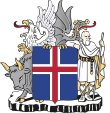 |
|---|
Parliamentary elections were held in Iceland on 28 October 1911. [1]
 |
|---|
Parliamentary elections were held in Iceland on 28 October 1911. [1]
The 30 elected members of the Althing were elected from single or double member constituencies by first-past-the-post voting, with six members appointed to the upper house by the Danish monarch. [2] [3] Suffrage was limited to men aged 25 or over and who met one of several set requirements including being a civil servant, holding a medical (or similar) degree, being a graduate of a university or seminary, or paying tax of at least four króna (or for farmers, any level of tax), and who were not in receipt of poor relief. [3]
10,303 of the 13,136 registered voters participated in the elections. [4]

Iceland is a Nordic island country between the North Atlantic and Arctic Oceans, on the Mid-Atlantic Ridge between North America and Europe. It is linked culturally and politically with Europe, and is the region's most sparsely populated country. Its capital and largest city is Reykjavík, which is home to about 36% of the country's roughly 380,000 residents. The official language of the country is Icelandic.

The politics of Iceland take place in the framework of a parliamentary representative democratic republic, whereby the president is the head of state, while the prime minister of Iceland serves as the head of government in a multi-party system. Executive power is exercised by the government. Legislative power is vested in both the government and the parliament, the Althingi. The judiciary is independent of the executive and the legislature.

The Alþingi, anglicised as Althingi or Althing, is the supreme national parliament of Iceland. It is one of the oldest surviving parliaments in the world. The Althing was founded in 930 at Þingvellir, situated approximately 45 kilometres (28 mi) east of what later became the country's capital, Reykjavík. After Iceland's union with Norway in 1262, the Althing lost its legislative power, which was not restored until 1903 when Iceland gained Home Rule from Denmark. For 641 years, the Althing did not serve as the parliament of Iceland, ultimately power rested with the Norwegian, and subsequently the Danish throne. Even after Iceland's union with Norway in 1262, the Althing still held its sessions at Þingvellir until 1800, when it was discontinued. It was restored in 1844 by royal decree and moved to Reykjavík. The restored unicameral legislature first came together in 1845 and after 1874 operated in two chambers with an additional third chamber taking on a greater role as the decades passed until 1991 when Althing became once again unicameral. The present parliament building, the Alþingishús, was built in 1881, made of hewn Icelandic stone. The unicameral parliament has 63 members, and is elected every four years based on party-list proportional representation. The current speaker of the Althing is Birgir Ármannsson.

The Progressive Party is an agrarian political party in Iceland.
Iceland elects on a national level a ceremonial head of state—the president—and a legislature. The president is elected for a four-year term by the people. The parliament (Alþingi) has 63 members, elected for a four-year term by proportional representation using the D'Hondt method with a closed list. Iceland has a multi-party system, with numerous parties in which no one party typically has a chance of gaining power alone which typically results in a hung parliament, so parties must work with each other to form coalition governments.

Eva Joly is a Norwegian-born French juge d'instruction (magistrate) and politician for Europe Écologie–The Greens. She represented that party as a candidate for the presidency of France in the 2012 elections. She also served as a Member of the European Parliament from 2009 until 2019.
Parliamentary elections were held in Iceland on 10 May 2003. The Independence Party remained the largest party in the Althing, winning 22 of the 63 seats. The coalition government of the Independence Party and Progressive Party remained in office, with Davíð Oddsson continuing as Prime Minister.
Iceland is an island country between the North Atlantic and Arctic Oceans, on the Mid-Atlantic Ridge between North America and Europe. Icelandic nationality is concerned with the conditions by which an individual is a national of Iceland.

Sigmundur Davíð Gunnlaugsson is an Icelandic politician who was the prime minister of Iceland from May 2013 until April 2016. He was also chairman of the Progressive Party from 2009 to October 2016. He was elected to the Althing as the 8th member for the Reykjavík North Constituency on 25 April 2009. He has represented the Northeast Constituency as its 1st member since 27 April 2013. Taking office at 38, he was the youngest Icelander to become prime minister.

The Pirate Party is a political party in Iceland. The party's platform is based on pirate politics and direct democracy. The party was founded on 24 November 2012 and ran for the first time in the 2013 parliamentary election.
Parliamentary elections were held in Iceland on 10 September 1908, alongside a referendum on prohibition.
Parliamentary elections were held in Iceland on 10 September 1914. They were the last parliamentary elections in which only men could vote.
Parliamentary elections were held in Iceland in June 1903.
Parliamentary elections were held in Iceland in June 1902.
Parliamentary elections were held in Iceland in September 1900.
Parliamentary elections were held in Iceland in June 1894.
Parliamentary elections were held in Iceland in September 1892.
Parliamentary elections were held in Iceland in June 1886.
Parliamentary elections were held in Iceland in September 1880.
Parliamentary elections were held in Iceland in the autumn of 1874. The elections were the first after the introduction of a new constitution, which granted legislative and financial powers to the Althing and increased the number of members from 27 to 36.